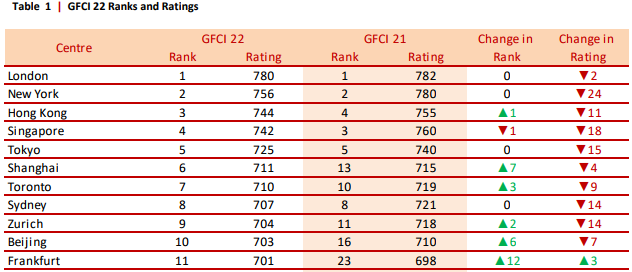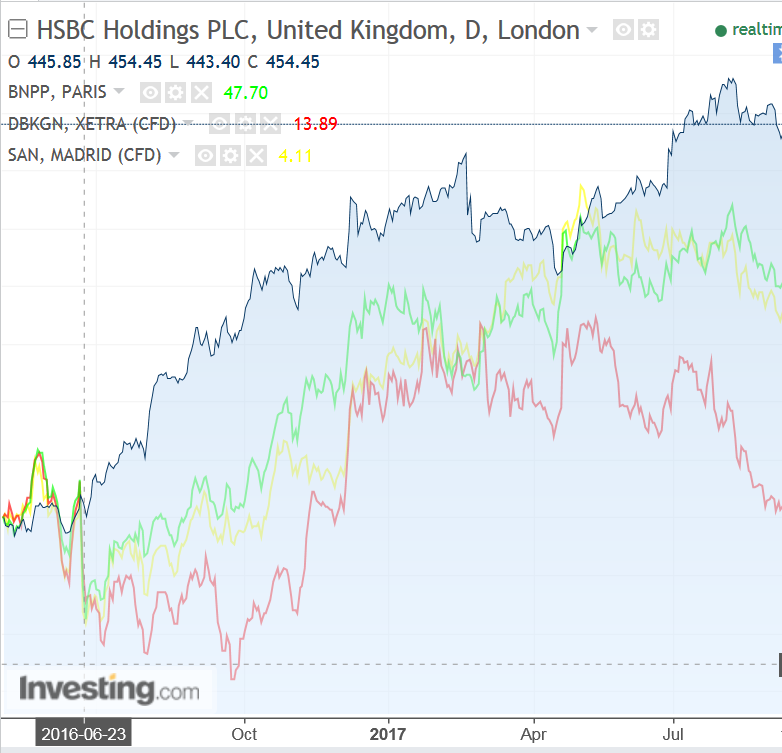by Jason Martin
As the fourth round of Brexit negotiations, scheduled for September 25, nears, the volume of complaints coming from the financial services sector regarding the lack of progress is growing. That makes sense. Until Britain and the European Union ink their trade agreements, banks operating in the region are unable to forge ahead with strategies for their own multinational businesses.
Bank stock prices and public opinion about the value of London as a financial center clearly show that in all likelihood, much of this is political “noise.” As we'll discuss, the impact of politicians' decisions about the future relationship between the UK and the EU will have little—if any—serious impact on the banking sector and our findings suggest that investors may do better to focus on other considerations.
Brexit: Negotiators Continue to Bicker
EU negotiators have insisted that before talks on trade can begin, key topics such as citizens’ rights, the UK’s payment upon departure and discussion over the Irish border must be dealt with.
However, even after the third round of talks concluded at the end of August, Brexit negotiators seemed unable to even agree on whether any progress has been made.
“We did not get any decisive progress on any of the principle subjects,” European Chief Negotiator for Brexit Michel Barnier said at the end of the last negotiations, although he conceded that discussions over the Irish border had been “fruitful”.
Conversely, his British counterpart David Davis, UK Secretary of State for Exiting the European Union, asserted that both parties had made “some concrete progress”.
The obvious difference of opinion naturally makes one wonder whether Barnier and Davis had in fact even been in the same meetings as they negotiated the terms for the UK’s departure from the EU, leaving banks in a constant state of uncertainty ahead of key decisions on how to progress with their Brexit strategies.
Banks in Strategic Limbo
“Faced with no clarity of the future relationship between the EU and the UK, market participants are having to take important decisions amid considerable uncertainty”, the Association for Financial Markets in Europe (AFME), that styles itself as the “voice of Europe’s wholesale financial markets”, warned in a recent report.
In conjunction with UK Finance, which represents nearly 300 of the leading firms providing finance, banking, markets and payments-related services in or from the UK, AFME published a joint paper with suggestions for British and European authorities on how to deal with the issues arising from Brexit.
“Contractual uncertainty of cross-border contracts post-Brexit needs to be addressed promptly by all parties to avoid damaging impacts for customers on both sides of the Channel,” UK Finance CEO Steven Jones said.
“This issue is wide-ranging and not just limited to banking, affecting cross-border products and services across payments, insurance and investment management services also,” he added.
“It is estimated that €1.3 trillion ($1.56 trillion) of UK-based bank assets are related to the cross-border provision of financial products and services – many of which support EU exporting businesses that are key drivers of growth,” AFME chief executive Simon Lewis specified.
Both experts suggested that clarifying these issues was “critical”.
At the crux of the problem is exactly that “contractual uncertainty” with global banks lacking details on what will be required for them to continue business as usual, and even if that will be at all possible.
While headlines are awash with information about banks setting up contingency plans that include moving some employees to Frankfurt or Dublin, according to a report earlier this month, fewer than 10 of the approximately 40 banks that conduct EU business out of London have actually filed formal applications so far for a license to continue banking in the bloc after Britain leaves.
Among those 40 financial institutions that do business in the EU and are based in London, there are British lenders and US investment banks, along with some smaller groups from both Asia and the Middle East, according to Sabine Lautenshlaeger, vice chair at the European Central Bank’s division for the supervision of banks.
In some cases such as Barclays (NYSE:BCS), Citigroup (NYSE:C), HSBC (NYSE:HSBC), JP Morgan (NYSE:JPM) and State Street (NYSE:STT), their subsidiaries in London are already big enough to be supervised by the ECB directly, although the question remains regarding exactly what permission, if any, they would need if they opt to expand their operations to the Continent.
Among British banks, Barclays itself has announced plans to secure an expanded license for its subsidiary in Ireland, while Royal Bank of Scotland (NYSE:RBS) is reportedly negotiating with Dutch regulators over the switch of some staff and business to its already-existing subsidiary in the Netherlands. Lloyds (NYSE:LYG) and Standard Chartered (LON:STAN) have given indications that they could pursue formal submissions before the end of the year.
Even though the Brexit cutoff date is not until March 2019, the application for a banking license, to an EU member state's national regulator and to the ECB, can take six to 12 months, or even longer in the event of a rush of requests.
The fourth round of UK-EU negotiations was delayed by a week and will now take place on September 25 because of an upcoming speech from British Prime Minister Theresa May.
According to May’s spokesman, the Prime Minister will speak on September 22 in Florence, Italy to outline the kind of ties Britain wants to have with the EU after it leaves the bloc, setting the stage for the discussions to follow.
The fifth round of negotiations was tentatively scheduled for October 9, coming just 10 days ahead of a two-day EU summit.
Breaking with the hardline from EU negotiators, reports near the end of August suggested that French diplomats were pushing to begin trade talks with Britain as early as October.
In that light, the upcoming EU summit may serve as a pivot point for the region’s politicians to reconsider their positions on the issue, although more skeptical observers point to the current lack of progress and suggest that the following summit in mid-December would be a more likely scenario for serious talks to begin.
London Remains Top Financial Center, Bank Stocks Unpunished
All that aside, little impact has been seen on either London’s status as the world’s number one ranked financial center or bank stock prices in general.
In Z/Yen’s 22nd edition of rankings of global financial centers, known as GFCI 22, London continued to hold the premier spot against 107 competitors.

“Interestingly, despite the ongoing Brexit negotiations, London only fell two points, the smallest decline in the top ten centers,” the surveyor noted.
That compared to a 24 point fall for New York, which Z/Yen explained was “presumably due to fears over US trade.”
Financial centers on the Continent remained volatile:
“Overall assessments for the European centers continued to fluctuate as people speculate about which centers might benefit from London leaving the EU.”
“However, the majority of centers in the region rose with Stockholm, Copenhagen, and Vienna all showing strong rises,” the surveyor concluded.
British and European bank stocks have remained unscathed since the UK’s EU referendum, held on June 23, 2016.
As can be seen in the comparative chart below, the biggest banks by total assets in the UK, France, Germany and Spain have all seen considerable upside despite any supposed concerns over future regulation.

Specifically, UK’s HSBC (LON:HSBA) has seen shares rise by nearly 43% since the EU referendum, while France’s BNP Paribas (PA:BNPP) is 38% higher and Spain’s Banco Santander (MC:SAN) boasts gains of 35% to name a few examples. Even Germany’s Deutsche Bank (DE:DBKGn), whose stock has been pummeled by concerns about its turnaround plan, has still managed to return gains of 3% during the period in question.
The GFCI 22 and the above examples of stock prices from the largest banks show that opinion has been unaffected by worries over how eventual agreements between the UK and the EU will pan out.
Undoubtedly, financial institutions face certain “contractual uncertainties” as they wait for negotiators to iron out their differences and lay down what future regulations will be. It’s not surprising that JP Morgan (NYSE:JPM), Morgan Stanley (NYSE:MS), Citigroup (NYSE:C) and Goldman Sachs (NYSE:GS) sought to maintain the status quo prior to the UK vote and all donated to the campaign for Britain to remain a part of the EU.
For investors, the underlying question is exactly how the overall effect will hit banks’ books. Admittedly, reorganization costs could definitely hit the bottom line, but there is no way to calculate this unknown.
In fact, London is not exactly the cheapest place in the world to do business and banks might actually benefit from relocating services to cheaper locations. “Longer-term, US banks could benefit given high costs in London,” a CLSA analyst told the Financial Times back in July 2016, not long after the vote for the UK to leave the EU became a reality.
There have been far too many “self-interested” comments on what could happen depending on the outcome of negotiations in order to make a feasible estimate of how one outcome or the other will eventually affect the bottom line. In general, banks are fighting to maintain the status quo as much as possible.
What needs to be kept in mind is that the uncertainty of the Brexit isn't the only factor to be considered. Citigroup chief financial officer John Gerspach recently warned that third-quarter total markets revenue was running about 15% less than a year earlier when volatility was boosted by reactions to the Brexit vote and US elections.
In other words, external factors are already hampering trading revenues via the year-on-year comparison. And that has nothing to do with the Brexit negotiations.
Banks’ business models will, without a doubt, need adjustments whatever the outcome of the Brexit negotiation may be. However, until the endgame is decided by Brexit negotiators, trying to predict what the impact will be on the bottom line is merely sport for pundits.
Add to that the fact that financial institutions have an uncanny way of pushing through paperwork in order to secure regulatory loopholes allowing them to carry through with their strategies.
As it stands, the ECB has already highlighted its very concerns with regard to the issue. Banks can currently avoid the monetary authority’s supervision by applying for a broker-dealer license to the national supervisor of European countries, rather than a banking license.
While that would bar them from taking deposits or writing loans, they would still be able to deal in securities.
In short, the clock may be ticking for Brexit negotiators, but financial institutions will likely take the results—whatever they may be—in stride. To judge from the prices of bank stocks since the EU referendum, concerns so far are negligible.
Investors would do better to worry about the impact of central banks’ considerations for the removal of accommodative policy on the balance sheets of financial institutions rather than the, as of yet, incalculable effect of the “possible” reallocation of resources in the face of undetermined political decisions.
